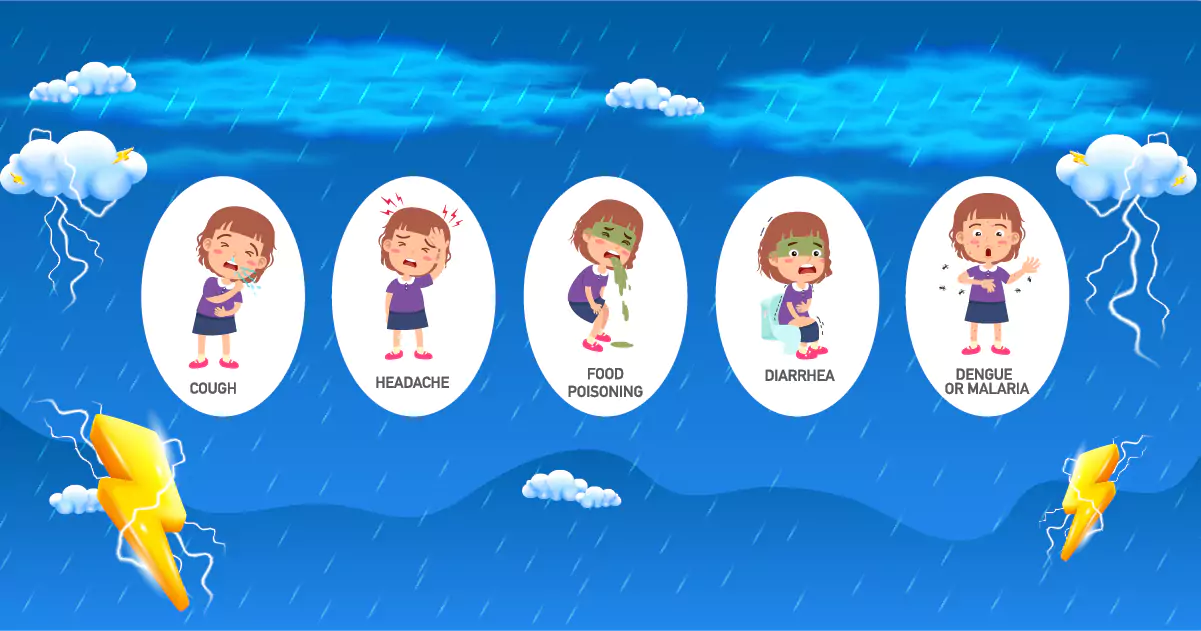According to the World Health Organization (WHO), vector-borne diseases account for more than 17% of all infectious diseases, causing more than 700,000 deaths annually.
As the monsoon season arrives, bringing relief from the scorching heat, it also ushers in a host of health challenges. In many regions, the incidence of waterborne and vector-borne diseases spikes during the rainy season due to increased breeding of mosquitoes and contamination of water sources. Here’s a list of the top five diseases you should be aware of during the rainy season, along with their symptoms and prevention tips:
1. Dengue Fever
How is dengue an infectious disease?
Dengue fever, transmitted by the Aedes mosquito, is a major concern during the monsoon season. The pooled water from rain provides an ideal breeding ground for these mosquitoes.
Dengue Symptoms:
High fever, severe headache, pain behind the eyes, joint and muscle pain, rash, and mild bleeding (nose or gums).
Prevention Tips:
- Avoid Stagnant Water: Ensure there is no stagnant water around your home, as it serves as a breeding ground for mosquitoes.
- Use Mosquito Repellents: Apply mosquito repellent creams and use nets or screens on windows and doors.
- Wear Protective Clothing: Wear long-sleeved shirts and long pants to reduce skin exposure.
2. Malaria
How is Malaria a communicable disease?
Malaria becomes a communicable disease during the monsoon due to the ideal breeding conditions for Anopheles mosquitoes created by the abundant stagnant water from heavy rains. The wet and humid environment during this season fosters a higher mosquito population, increasing the likelihood of transmission.
Symptoms:
High fever, chills, sweating, headache, nausea, and vomiting
Prevention Tips:
- Use mosquito repellents and nets.
- Ensure proper drainage systems to avoid stagnant water.
- Take antimalarial medications if you are in a high-risk area.
3. Typhoid Fever
How is Typhoid a communicable disease?
Typhoid Fever is a result of contaminated food and water—another bacterial infection caused by Salmonella typhi.
Symptoms:
Prolonged high fever, weakness, stomach pain, headache, loss of appetite, and sometimes a rash.
Prevention:
- Drink only purified or boiled water.
- Avoid street food and eat only well-cooked meals.
- Practice good hand hygiene.
4. Tuberculosis
How is TB a communicable disease?
Tuberculosis (TB) is a contagious bacterial infection caused by Mycobacterium tuberculosis, primarily affecting the lungs. While TB is not exclusively a monsoon-related disease, the season can exacerbate certain conditions that facilitate its spread and impact. Jaundice (Hepatitis A and E)
Symptoms:
Persistent cough that lasts more than three weeks, Coughing up blood, Chest pain, Unintentional weight loss, Fever and chills, Night sweats, Loss of appetite, Fatigue
Prevention Tips:
- Ensure at-risk populations receive the Bacillus Calmette-Guérin (BCG) vaccine for protection against TB, especially in children.
- Maintain well-ventilated living and working spaces to help disperse airborne TB bacteria and reduce the risk of inhalation.
- Adherence to the full course of prescribed medication is crucial for recovery and preventing transmission.
5. Jaundice
Is Jaundice a communicable disease?
Jaundice, often caused by hepatitis A and E viruses, is transmitted through contaminated food and water. The risk of infection increases during the monsoon due to water contamination from flooding.
Symptoms:
Yellowing of the skin and eyes, Dark urine, Pale stools, Fatigue, Nausea and vomiting, Abdominal pain, Prevention:
Prevention:
- Drink clean, purified water.
- Practice good hygiene and handwashing.
- Avoid raw or undercooked food.
- Ensure proper sanitation and food safety practices.
General Tips to Stay Healthy During the Monsoon
- Maintain Hygiene: Wash hands regularly with soap and water.
- Eat Fresh Food: Avoid eating raw or street food, which might be contaminated.
- Stay Dry: Keep yourself dry to prevent fungal infections.
- Boost Immunity: Eat a balanced diet rich in vitamins and minerals to strengthen your immune system.
- Stay Hydrated: Drink plenty of clean water to stay hydrated.
Why buy Health Insurance During Monsoon
- Monsoon-related diseases: It can lead to significant medical expenses due to hospital visits, diagnostic tests, medications, and sometimes prolonged treatment. Here’s why health insurance is essential:
- Financial Protection: Health insurance provides financial coverage for medical expenses, reducing the burden of out-of-pocket costs.
- Access to Quality Care: Insurance ensures access to a network of hospitals and healthcare providers, ensuring timely and quality treatment.
- Comprehensive Coverage: Many health insurance plans cover hospitalization, outpatient consultations, diagnostic tests, and sometimes even preventive measures like vaccinations.
- Emergency Coverage: In case of severe conditions requiring immediate attention, health insurance can cover emergency treatments and hospital stays.
- Peace of Mind: Knowing that you are financially protected allows you to focus on recovery and health without the stress of medical bills.
Bottom Line
By taking these preventive measures and being aware of the symptoms, you can protect yourself and your loved ones from these common monsoon diseases. Stay vigilant, practice good hygiene, and seek medical attention promptly if you notice any symptoms. Enjoy the monsoon season safely!
Also Read: How To File a Reimbursement Claim Under Health Insurance









